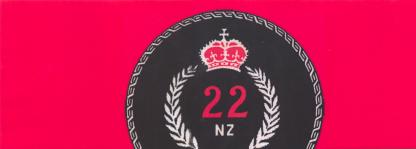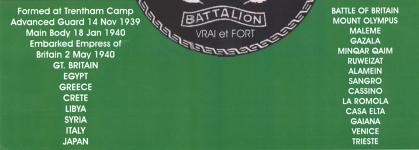TWENTY-SECOND TO NONE
The History of the 22nd (N.Z.) Battalion
By Terence Power Mclean
CHAPTER SEVEN
3 January – 3 March 1941
Journey to Egypt
The second great voyage of the battalion was not as comfortable as the first. Unlike the Empress of Britain, which had since been sunk by bombing and torpedoing, the Duchess of Bedford had been converted to troop carrying and the conditions of living were often almost intolerable for the great many men aboard. This was especially the experience in the tropics. The ship was christened, not fondly, the “Drunken Duchess”, because of its gyrations at sea, and early epidemics of measles and influenza, the latter caused by the cold of the last weeks in England, and later outbreaks of boredom were a notable contrast to the uniform pleasantness of life aboard the Empress of Britain. In many ways, however, the voyage demonstrated that discipline generally was of a much higher standard than it had been in the first voyage. The necessity of sleeping fully clothed because of the danger of air attack was borne without complaint and unpleasant memories of drunkenly obnoxious behaviour by many Anzacs in the first leave at Cape Town were offset by average behaviour of a high standard during the stay in the port of the Duchess of Bedford. There were, of course, variations in the pattern. Photographs of the giant convoy in which the ship sailed were often taken in spite of the order against the practice, and the warning, “Air Raid,” was passed from man to man when raids were made on the gambling schools. Col Andrew was dignified by the term “Big Bomber,” when he took part in raids. It was several days before the voyage was begun. The Duchess was boarded at Newport on 4 January and left the roads at 0500 hours on 7 Jan for Belfast Lough. The first boat deck muster in the Lough took two hours and the greatest care in assigning boat stations was taken. On 10 Jan, the Athlone Castle, bearing the 23rd and 28th new Zealand battalions, sailed into the Lough and on 12 Jan the full convoy assembled off the Firth of Clyde. The assembly was like a parade of world shipping. There were the Duchess of Bedford, Athlone Castle, Monarch of Bermuda, Winchester Castle, Windsor Castle, Empress of Australia, Brittanic, Samaria, Ormonde, Franconia, Penland, Highland Chieftain, Durban Castle, Duchess of Richmond, New Hellas, Cameronia, Duchess of York, Capetown Castle, Arundel Castle, and the Empress of Japan. The battleship HMS Ramillies was the first ship of the naval escort and the cruisers included HMAS Australia and HMS Emerald. Part of he diversion of the voyage was the identification of the members of the great host, and at dawn and dusk, when the great liners loomed up from and receded into the murk, the sight was unforgettable. Fog station practice, with each ship using its horn at frequent intervals, was notable for the unearthliness of the noise and when gun crews tried out their Oerlikons the noise was like battle. The course was north and west into the wastes of the Atlantic for a start and the days were cold and gloomy. With the swing south there was pleasing warmth for a time and then great heat as the tropics were approached. The sick parades for each battalion averaged about 30 men a day for the first few days and in the battalion there was great concern at the news that Pte J Calson, of the pipe band, was dangerously ill with pneumonia. He did not rally from the illness and on 16 Jan he became the third of the original band to die. His burial was a solemn moment. The Duchess of Bedford pulled out of the convoy and her engines were stopped as Calson’s body was put over the side and the pipes played the unutterably sad “Flowers of the Forest.” The entry into Freetown on 25 Jan was exciting. An airplane, suspected to be French from Dakar, circled at about 8000 feet. The pilot did not reply to signals and the guns opened up. Not much harm was done to either side, but it was very noisy for a few minutes. Four days in Freetown were not amusing. The great heat was enervating and he fun of chasing bumboats from the ship’s sides with hoses grew wearisome. An excessively cautious person had decreed that the sleeping out on deck which had made life bearable for the rank and file just before arrival must cease in Freetown because of the mosquito danger and for two days the troops sweltered with portholes locked until the discovery that the season was not timely for malaria was made. “To eliminate weaknesses that have developed,” as the order stated, coy commanders were changed about before the arrival in Capetown. Major Leggat had become second in command of the battalion following the appointment of Major McNaught as CO of the newly-formed 29th battalion in England. The new appointments were: A Coy: Captain Hanton; B; Captain Laws; C; Major Hart; D: Major Bain; HQ: Captain Bourke. Capetown was reached on 9 February and there was leave on the first day from 1400 to 2359 hours. The city at night was like a wonderland with street lights blazing and no form of blackout and its hospitality was as great as before. Subsequently, until departure on 12 Feb, a two-hour route march was staged each morning and there was an amusing moment in one of them. An English regiment was marching on the same road as the battalion and there was a momentary confusion as to which unit should have right of way. An account says that Col Andrew’s moustaches bristled faintly, he moved smartly to the head of his column and with a crack and a jump the battalion flew past the Tommy column. Part of the convoy had sailed on to Durban and on 16 Feb the full convoy was re-assembled off the port. On 20 Feb, battalion representatives fought with distinction in a ship’s boxing contest. Pte AH Peterson of B Coy won the novice flyweight and Pte Foxley of C Coy the novice heavyweight. The ship’s lightweight title was won by Pte BM Wicksteed of D Coy and another of the same coy, Pte Kettle, the 2 NZDF (UK) champion, won the welterweight championship. A staggering prelude to Egypt was the issue of Bombay bloomers, the infamous shorts which reached the calf and which were as wide as a church door. A soldier dressed in issue looked like a prehistoric monstrosity. As the convoy moved up the African coast, orders requiring the instant obedience of emergency regulations were published. On 26 February, the convoy was in sight for the first time of enemy territory when the coast of Italian Somaliland was sighted. At 0300 hours on 28 Feb, the Red Sea was entered and at 1800 hours on 3 March, after a voyage of nearly two months, anchors splashed at the port of Tewfik, near the southern entrance to the Suez Canal. The harbour was a mass of shipping. Barrage balloons floated in profusion. First contact with worthy Oriental gentleman, the “Wogs” of the future, was made and the smells and chatter and confusion of the mysterious East was made. There was plenty of both chattering and confusion, in good Anglo-Saxon, when a soldier, aggravated by the highest kipper of all, threw the dish convulsively from a porthole and collected, gravy and kipper, a stately and resplendent colonel. The battalion left its dancing Duchess at 1600 hours on 6 March and journeyed by train to the New Zealand camp at Helwan, about 18 miles south of Cairo on the eastern bank of the Nile. It was welcomed there by the members of the advance party who had arrived at Tewfik on 16 Feb. The voyage of he advance party had been exciting. On Christmas Day, a German cruiser of the von Hipper class shelled the convoy. The ships scattered and he Navy and the Fleet Air Arm took counter-action. One ship of the convoy was holed above the water-line. There were no further incidents in the voyage and a material interest lay in the performance of a battalion boxing team organised by Pte Hargreaves. A South African who boarded the Elizabethville at Durban had a formidable reputation as a fighter and challenged all comers. After some persuasion, Pte J Weir agreed to defend both the honour of the battalion and New Zealand against the Springbok and he won the fight with a good deal to spare. Pte Bonnett also contributed his mark toward the voyage. He was found on his bed by an English officer. “What are you doing here?” the officer asked. “I am on guard.” “Then why have you your light?” “How the blazes,” said Bonnet, “do you think I can read a book without a light.” He scrubbed walls for two days. The consolidated battalion was soon hard at work. There was little time. Greece and the first fighting by New Zealand soldiers in the war lay immediately ahead.
|



